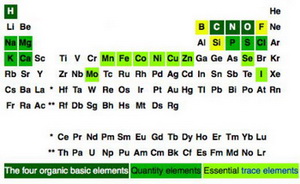|
Dietary Minerals – Elements That Are Essential NutrientsDietary minerals and nutrition are intimately linked together. Minerals are not changed during digestion or through use by the body. Minerals are not destroyed by heat, light or alkalinity. Minerals are in fact inorganic elements that can be found on the periodic table, that are considered atoms or ions.
Minerals like other nutrients play many essential roles in the body. Some minerals participate in the activities of enzymes; others assist with maintaining the structures of bones. There are two categories of minerals depending on the amount needed in the diet and the amount in the body, as a result some minerals are major minerals and some are trace minerals. The daily requirement of major minerals is 100 milligrams/day and less than 100 milligrams/day of trace minerals. Major Minerals Trace Minerals Ultratrace Minerals There are minuscule amounts of minerals in the body that may have a requirement of less than 1 milligram/day. These ultratrace minerals are Arsenic (As), Boron (B), Nickel (N), Silicon (Si), and Vanadium (V). These ultratrace minerals are currently still in the research phase to determine what role if any they play in biochemical functions in the human body, and at present there is not a lot of information about these minerals to make conclusive statements about their roles in the human diet. Mineral Sources Both animals and plants provide minerals. Since animal tissues provide minerals in the proportion that is needed by the animal, these are reliable sources of minerals. Mineral availability in plants is in proportion to the minerals in the soils that the plants are growing in.
The gastrointestinal tract does not absorb as much of dietary minerals as it does vitamins because the excess of a mineral is more difficult for the body to get rid of than vitamins, as a result the body often adjusts the availability of a particular mineral in relation to what the need is.
For other information on nutrition some great references are: • Nutrition – Fourth Edition by Paul Insel, Don Ross, Kimberley McMahon, and Melissa Bernstein • The Vitamin Alphabet – Your guide to vitamins, minerals and food supplements by Dr. Christiana Scott-Moncrieff MB, CHB, MFHOM
Nutrients In Food
|
Dietary Minerals-Part of The Periodic Table of Elements






